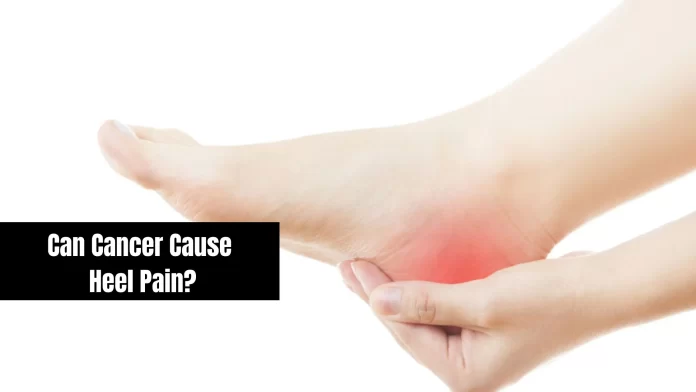Cancer is an ailment that could impact any part of the frame and happen in various approaches. Although heel pain is a regularly mentioned issue, it isn’t always usually related to most cancers. Nevertheless, it is crucial to carefully examine all capability motives for worrisome signs and symptoms, which include the remote risk of cancer. In this text, we can look at whether is heel pain a sign of cancer and discuss the measures that can be taken to pinpoint and manage the root purpose.
Types of Cancer That Can Cause Heel Pain
One form of cancer that has the potential to result in heel ache is bone cancer. This specific most cancers originates inside the cells that compose our bones and can broaden in any bone, together with the heel. Common symptoms of bone most cancers embody increasing ache in the affected location over time, in addition to swelling or tenderness in that place, at the side of problems moving the affected limb. It’s well worth noting that bone cancer is distinctly uncommon, accounting for best about 1% of all most cancers cases.
Additionally, there are different types of cancer that could probably unfold to the heel and induce pain. These encompass breast, prostate, and lung cancer. When cancer spreads to a exceptional a part of the frame, it is termed secondary or metastatic cancer. Symptoms of metastatic cancer may also range relying at the region and sort of cancer however frequently involve pain, swelling, and adjustments in the advent of the affected place.
Second Cause of Heel Pain
While cancer is a possible cause of heel pain, there are many other common causes of heel pain that are not related to cancer. These side effects include inflammation of the legs, bursitis, and stress fractures.
Plantar fasciitis is a common cause of heel pain when the muscles running down the heel become tight or inflamed
Bursitis occurs when bursitis, the small fluid-filled pockets that soften and protect the joint, becomes inflamed Bursitis occurs in the lower leg, causing pain, especially when walking or standing on the affected foot the.
Stress fractures are small cracks in bone that occur as a result of repetitive or overuse injuries. Stress fractures in the heel or foot can cause pain, swelling and difficulty walking.
RELATED: How To Reduce Inflammation In The Body Fast
When to Seek Medical Attention for Heel Cancer
If you’re dealing with continual or severe heel pain, regardless of whether or not it might be a signal of cancer, it is essential to are seeking clinical attention. Your healthcare provider is the best man or woman to decide the root purpose of your heel pain and advocate the precise treatment.
Furthermore, it is crucial to openly talk any troubling signs or ability most cancers danger elements along with your healthcare provider. These threat elements may want to embody a own family records of most cancers, specific inherited genetic mutations, sure life-style selections like smoking and excessive alcohol intake, and exposure to sure environmental factors.
Alongside looking for medical help for ongoing or intense heel ache, timely treatment for any underlying situation, whether or not cancer-related or not, is crucial on your standard fitness and well-being.
Conclusion
In end, at the same time as heel pain isn’t usually associated with most cancers, it’s far essential to take into account all feasible causes of regarding signs and are seeking medical attention if important. Types of cancer that could potentially motive heel pain consist of bone cancer and cancers that have unfold, or metastasized, to the heel. Other, extra commonplace causes of heel ache consist of plantar fasciitis, bursitis, and stress fractures.
It is crucial to acquire an correct prognosis and appropriate remedy for any underlying condition in an effort to relieve signs and symptoms and prevent similarly damage. If you are experiencing chronic or severe heel pain, it’s far critical to are seeking scientific interest and speak any regarding signs and symptoms or threat elements for most cancers together with your healthcare issuer.
I hope you liked our article on heel pain a sign of cancer, if you have any comments or suggestions do share them in the comments below.
Related Faq Of Heel Cancer
Q1: Is pain the most common symptom of bone cancer?
Ans: Yes, pain is a commonplace symptom of bone cancer. It often starts as a dull ache and may grow to be extra extreme through the years.
Q2: What is the main cause of heel pain?
Ans: The important reason of heel ache is often plantar fasciitis, that’s inflammation of the tissue that runs along the lowest of the foot.
Q3: Is there any home remedy for heel pain?
Ans: Home remedies for heel ache consist of relaxation, ice, stretching physical games, proper shoes, and over the counter pain relievers. Consult a healthcare professional for intense or continual ache.
Q4: How painful is plantar fasciitis?
Ans: Plantar fasciitis may be quite painful, inflicting stabbing or burning sensations inside the heel or arch of the foot, especially within the morning or after extended interest.







